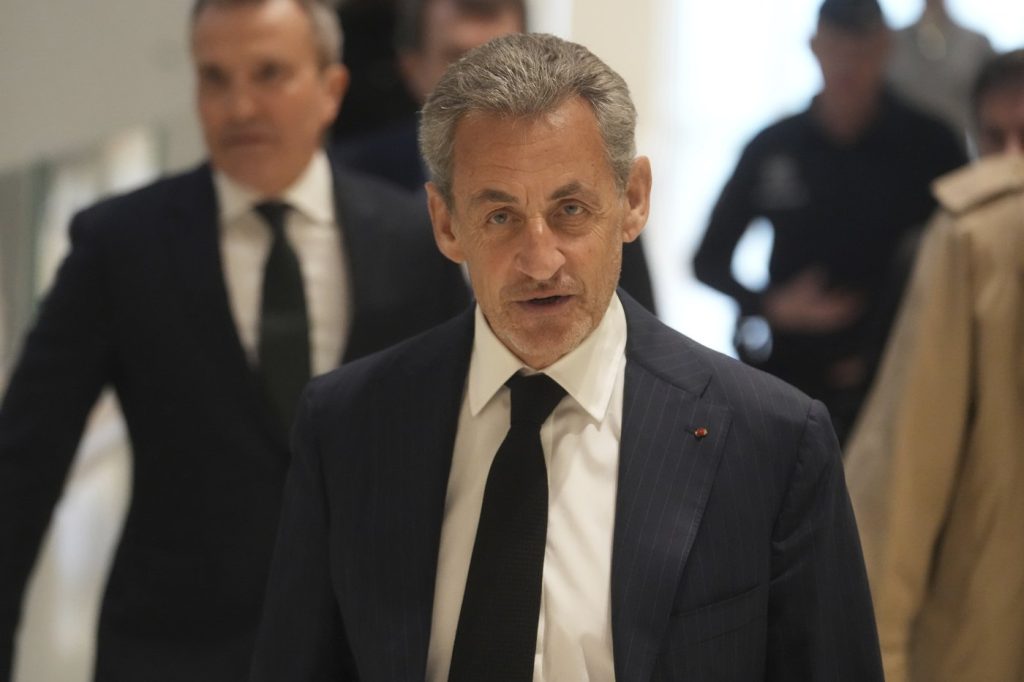PARIS (AP) - On Thursday, French prosecutors called for a seven-year prison sentence and a 300,000-euro (approximately $325,000) fine for former President Nicolas Sarkozy. This request is linked to allegations that his 2007 presidential campaign was illegally funded by the regime of former Libyan leader Moammar Gadhafi.
The National Financial Prosecutor's Office, referred to in France by the acronym PNF, has also recommended a five-year ban on Sarkozy's civic, civil, and family rights. This ban would prevent him from holding elected office or serving in any public judicial capacity.
This particular case, which opened in January and is expected to conclude by April 10, 2025, is seen as the most serious of the various legal controversies that have surrounded Sarkozy since he left the presidency. Between 2007 and 2012, Sarkozy served as France's president and now faces charges that include passive corruption, illegal campaign financing, concealment of embezzlement of public funds, and criminal association. Despite these accusations, he has consistently denied any wrongdoing.
The allegations date back to 2011, when both a Libyan news agency and Gadhafi asserted that millions of euros had been funneled into Sarkozy's 2007 campaign illegally. In 2012, investigative outlet Mediapart published a document purportedly from Libyan intelligence, which referenced a 50 million-euro funding agreement. Sarkozy denounced this memorandum as a forgery and subsequently filed a defamation lawsuit.
Later investigations by French magistrates suggested that the memo appeared authentic; however, no definitive evidence of a completed transaction has been produced. Prosecutors also investigated a series of trips made by Sarkozy's associates to Libya between 2005 and 2007, which has raised further questions regarding the financial dealings involved.
In 2016, Ziad Takieddine, a Franco-Lebanese businessman, claimed to Mediapart that he had transported suitcases filled with cash from Tripoli to the French Interior Ministry during Sarkozy's tenure. Although he subsequently retracted this statement, the retraction has led to a separate investigation focused on possible witness tampering, which has included preliminary investigations into Sarkozy and his wife, Carla Bruni-Sarkozy.
Sarkozy’s former ministers—Claude Guéant, Brice Hortefeux, and Éric Woerth—are also on trial, along with eight other defendants, though prosecutors have emphasized that Sarkozy is the central figure in this scandal. He is accused of knowingly benefiting from a corruption arrangement with a foreign dictator while campaigning for the presidency of France.
Sarkozy has already been convicted in two other legal matters; however, the Libya case is widely recognized as the most politically damaging and is likely to have a significant impact on his legacy. In December 2024, France's highest court upheld a conviction against him for corruption and influence peddling, sentencing him to one year of house arrest with an electronic bracelet. This ruling stemmed from evidence obtained during the Libya investigation. Furthermore, a Paris appeals court ruled in February 2024 that he was guilty of illegal campaign financing concerning his unsuccessful 2012 reelection bid.
Sarkozy has claimed that the allegations related to Libya are politically motivated and based on fabricated evidence. If convicted in this case, he would make history as the first former French president to be found guilty of accepting illegal foreign funds to secure election to office. A verdict in his trial is anticipated later this year.










